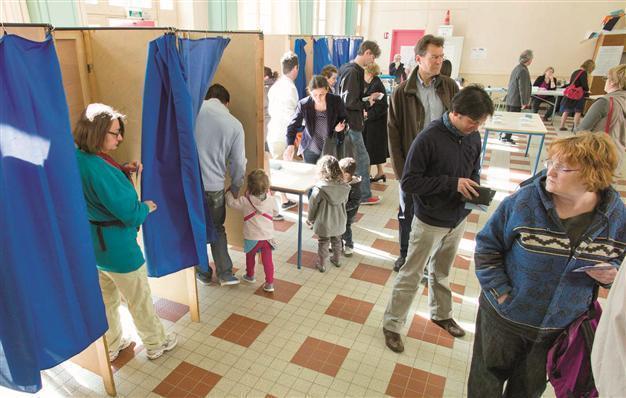Six countries go to polls for new rulers
ISTANBUL - Daily News with wires

Unemployment and the euro crisis have dominated the French presidential campaign as conservative President Sarkozy and his Socialist rival Hollande race for top post. REUTERS photo
France, Greece, Armenia, Italy, Serbia and Germany held crucial elections yesterday. French voters turned out in high numbers yesterday to give their verdict in a hard-fought presidential battle between right-wing incumbent Nicolas Sarkozy and his Socialist challenger François Hollande.Greeks, hammered by two years of deep spending cuts, voted in a parliamentary election critical to the country’s prospects for pulling itself out of a deep financial crisis.
Armenians voted in a new Parliament in an election that the nation’s president hoped would give him a majority among the lawmakers.
Serbia also held presidential, parliamentary and local elections. The outcomes could affect Serbia’s relations with the EU as well as Kosovo.
Italians voted in local elections, which were seen as a test of the country’s political mood nearly six months after Prime Minister Mario Monti’s government took over and imposed a biting austerity program. Angela Merkel’s conservatives also faced a photo-finish state vote in Germany’s north, knowing that losing power in Schleswig-Holstein could give vital momentum to the opposition and dent the chancellor’s re-election hopes.
In France, more than 46 million voters were eligible to take part and around 80 percent of them were expected to do so. Hollande voted early in his adopted hometown of Tulle, in the rural backwoods of the Correze region, accompanied by his girlfriend Valerie Trierweiler. Sarkozy and his wife Carla Bruni-Sarkozy voted at a high school in Paris’ chic 16th district.
In Greece, the election is unlikely to produce any clear winner, leaving the party with the most votes to seek coalition partners to form a government. The leading party will have three days to form a government, after which the mandate will go to the second party for a further three days, and then to the third party. If none can form a coalition government, the country will head to new elections, a prospect that worries Greece’s international lenders.
In Armenia, the elections are largely a straight fight between the governing Republican party of President Serzh Sarkisian and its current coalition partner led by Gagik Tsarukian. Campaigning in the Caucasus state, comprised of 3.3 million people, focused mainly on the issues of unemployment, poverty and emigration rather than Armenia’s long-running political disputes with its neighbors, Turkey and Azerbaijan.
In Italy, some 9.5 million Italians were expected to vote for mayors and council members in 1,024 towns, including several key urban centers such as Genoa, Palermo, Parma and Verona. The voting continues today for a second day. The vote is the first since the fall of Prime Minister Silvio Berlusconi in November and the ensuing adoption of austerity measures.
Serbs voted in a national election which gave them a sharp choice between a pro-Western government, or one that would bring back to power former nationalist allies of the late Balkan strongman Slobodan Milosevic. The election for president, parliament and local authorities will determine the pace of Serbia’s European Union-demanded economic and social reforms and whether Serbia continues to reconcile with its neighbors and Kosovo.
Voters in Germany’s northernmost state voted for a new legislature that will be an important popularity test for Chancellor Angela Merkel’s center-right coalition. Analysts say the coalition’s defeat would come as a blow to Merkel only one week before elections are due in North-Rhine Westphalia state, the country’s most populous with 18 million inhabitants.
Compiled from AFP, AP and Reuters stories by the Daily News staff.
















